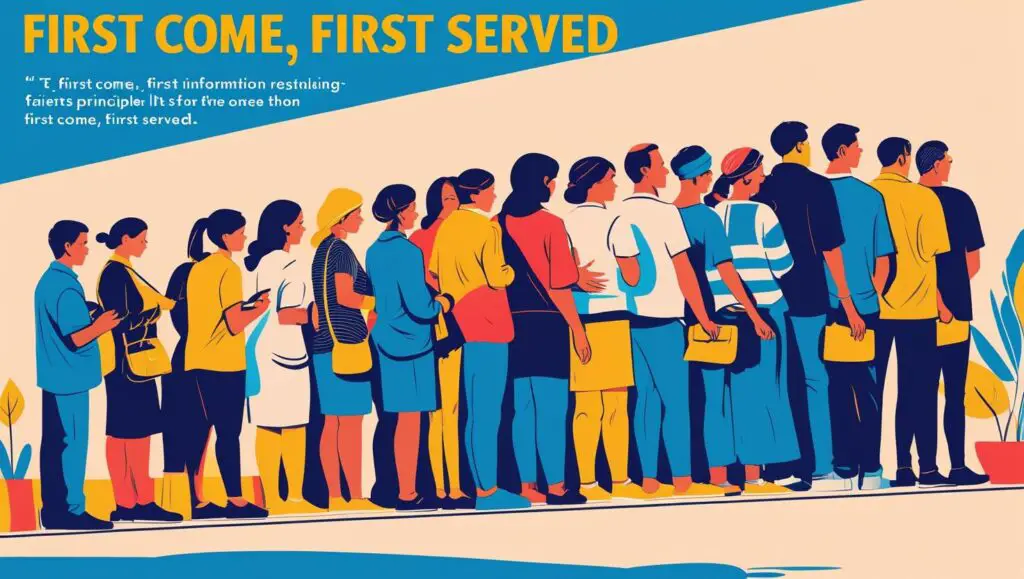Introduction: The Race to Be First
Have you ever stood in a long line for a new iPhone? Or rushed to book concert tickets the second they dropped? Welcome to the world of “To begin with Come To begin with Serve” (FCFS)-where the early fowl doesn’t fair get the worm, they get the entire devour. But have you ever ceased to ponder why we still live by this run the show in so numerous parts of life?
Let’s break it all down and investigate how this old-school thought is still kicking in our appear day world.
Breaking Down the Express “First Come First Serve”
What Does It Really Cruel?
At its center, FCFS is basic: whoever arrives to begin with gets served to begin with. Itss like being at a nourishment truck. Show up early, you eat early. Come late? You might go hungry. No favoritism, no filters—just pure timing.
Common Misinterpretations
Some folks twist the phrase to “First Come, First Served,” and while that’s grammatically smoother, the meaning remains. Individuals moreover befuddle it with fairness-but being to begin with doesn’t continuously cruel being reasonable, particularly on the off chance that others never had a genuine shot.
Historical Origins and Evolution
From Markets to Modern Times
The idea of FCFS dates back centuries. Think of merchants in ancient bazaars—you line up, you pay, you go. That’s it. No reservations, no VIP passes.
Legal and Business Roots
In business contracts, FCFS became a way to avoid disputes. Need 10 limited-edition products? Too bad if you’re #11. It protected sellers and streamlined distribution. It also snuck its way into job postings, reservations, and service industries.
Everyday Examples That Prove the Rule
Ticket Lines and Concerts
Ever camped out for concert tickets? Or frantically refreshed Ticketmaster? That’s FCFS in action. Those with faster fingers or better Wi-Fi win.
Black Friday Madness
We’ve all seen those wild clips of people trampling into stores on Black Friday. The first few get the best deals, while the latecomers are left with empty shelves.
Online Registrations
Whether it’s signing up for limited Zoom classes or early-bird conference rates, being quick is key. FCFS dominates the digital space too.
Why “First Come First Serve” Still Works Today
Simplicity at Its Best
Let’s face it—FCFS is easy to understand. No algorithms. No politics. Just show up and get served.
Encouraging Promptness and Efficiency
It pushes individuals to act quick. Slackers miss out, whereas go-getters are remunerated.In a world addicted to speed, this model keeps things moving.
Where It Fails: The Dark Side of FCFS
Lack of Fairness in Some Situations
Here’s the catch-being to begin with isn’t continuously reasonable. What approximately those who couldn’t make it due to inability, work, or need of assets? FCFS doesn’t account for personal circumstances.
Disadvantages for the Underserved
Individuals in rustic regions, without web get to, or confronting other obstructions regularly lose out. It’s effective, yes, but not continuously impartial.
First Come First Serve in the Digital Era
Online Booking Systems
From booking flights to reserving Airbnb stays, speed rules online. Blink, and that dream vacation spot is gone.
Limited-Stock eCommerce
Ever seen “Only 1 left in stock” on Amazon? That’s the digital form of FCFS creating urgency and sales pressure.
Social Media Giveaways
“First 100 people to comment WIN!” That’s FCFS with a social twist. Influencers use it to drive engagement and reward loyalty.
Comparing FCFS with Other Allocation Methods
Lottery Systems
Want a fairer way? Lotteries randomize access, giving everyone a shot—great for housing programs or event tickets.
Priority Queues
These give preference to seniors, VIPs, or high-paying customers. Not quite fair, but definitely structured.
Merit-Based Access
Used in jobs, scholarships, and elite programs, merit-based selection values skill over speed. It’s the tortoise beating the hare.
Psychological Impact of Being “First”
Scarcity Mentality
Scarcity breeds urgency. When we think something’s limited, we need to be first—even if we don’t actually need the thing. That’s how FCFS plays mind games.
The Fear of Missing Out (FOMO)
FOMO is real. FCFS thrives on it. It whispers, “Get it before it’s gone,” pushing people to act without thinking.
Best Practices When Using FCFS in Business
Communicate Clearly
If you’re running an FCFS promotion or event, be crystal clear. Outline the terms, the time, and what’s being offered. Ambiguity kills trust.
Avoid Overpromising
Only offer what you can actually deliver. Don’t say “First 50 get a gift” if you only have 20. That’s how brands lose credibility fast.
Conclusion: Is First Always Best?
So, is being to begin with continuously the proper call? Not truly. Whereas FCFS is quick, straightforward, and effective-it’s not continuously reasonable or comprehensive. In some cases, it rewards good fortune over exertion or get to over capacity. But when utilized admirably, particularly with clear rules and a bit of sympathy, it can still be a effective apparatus within the advanced world.
Whether you’re running a business or fair attempting to catch the final doughnut within the office kitchen, remember-being to begin with has its advantages, but it’s not the as it were way to play the diversion.
FAQs
1. Is “First Come First Serve” legally binding in business?
Yes, in numerous cases, particularly with limited-stock offers or administrations, as long as it’s communicated clearly.
2. What industries use FCFS the most?
Retail, neighborliness, amusement (concerts, motion pictures), and online administrations frequently depend on FCFS for speed and reasonableness.
3. Is there a fairer alternative to FCFS?
Lotteries and merit-based systems can be fairer, especially in government or nonprofit sectors.
4. How can FCFS be made more inclusive?
By combining it with accessibility options—like early access for disabled users or tiered time windows.
5. Why do people rush when something is FCFS?
Because of FOMO and scarcity psychology. The idea that you might miss out triggers instant action.

